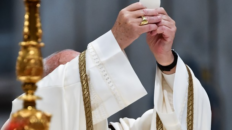Catholic priests are human and fallible, like everyone. But sometimes they’re outright heroes.
Several years ago, at her now-defunct blog the Crescat, Aleteia’s resident advice columnist Katrina Fernandez found this photo hereand marvelled at “the stuff our priests are made of!”
4 June 1962. Navy chaplain Luis Padillo was giving last rites to dying soldiers as sniper fire surrounded him. A wounded soldier pulled himself up by clinging to the priest’s cassock, as bullets chewed up the concrete around them. Hector Rondón Lovera, who had to lie flat to avoid getting shot, later said that he was unsure how he managed to take this picture. [See all pictures he took that day]. Norman Rockwell eerily used this photograph as a template for his Southern Justice painting, “Murder in Mississippi.”

I myself am struck by the sense of absolute calm in that image of Fr. Padillo. There is something startlingly grounded there. Unflappable. Daring, even

The image brought to mind the “Grunt Padre,” aka Servant of God Vincent Capodanno, who was killed in Vietnam:
Father Capodanno went among the wounded and dying, giving last rites and taking care of his beloved Marines. Always watching out for them, as they watched out for him. Wounded in the face and suffering a severe shrapnel wound that nearly severed his hand, during the epic battle of Dong Son in September 1967, Father Vince moved to help a wounded Marine only yards from an enemy machine gun. Father Capodanno died from a machine gun blast [while] taking care of this young Marine. When his body was recovered, he had 27 bullet wounds.

Fr. Capodanno’s story puts me in mind of another possible saint, Kansas-born Chaplain Father Emil Kapaun:
Feverishly working beyond the American lines in “no-man’s land,” he actually stopped an execution and negotiated with the enemy for the safety of wounded Americans. No one knows how many young soldiers he carried to safety on his back. Going back again and again he was finally taken prisoner as he tried to rescue another wounded soldier.
There is a great story about Kapaun, that while he was assisting a wounded man an enemy soldier approached and raised his rifle. Kapaun, apparently in no mood for it, hauled off and decked the soldier, before being taken prisoner.
Kapaun puts me in mind of:

Army Chaplain Fr. Tim Vakoc, who died of injuries sustained in Iraq.
Vakoc was injured on May 29, 2004 – the twelfth anniversary of his ordination to the priesthood – while returning from saying Mass for soldiers in the field in Iraq when his Humvee struck a roadside bomb (IED). He sustained a severe brain injury … On June 1, 2005, a flag – signed by Vakoc and his unit – was given to him. His first message to the visitors who presented the flag was “TIM 4F” (the military code for unfit for duty) and then “OK.”
And Fr. Vakoc’s story called to memory the incredible Fr. Aloysius Schmitt, Navy Chaplain, who had finished celebrating Mass on the USS Oklahoma just moments before the attack on Pearl Harbor, and died while helping other sailors get to safety.

Father Schmitt’s corroded chalice and water-stained Latin prayer book were found in the wreckage. The book was still marked with a page ribbon for prayers that morning, turned to the Eighth Psalm.
O Lord, our Lord,
how awesome is your name through all the earth!
I will sing of your majesty above the heavens.
Fr. Schmitt was the first Catholic priest killed while in service with U.S. military forces. The USS Schmitt, a Buckley-class destroyer escort in the US Navy, was named for him.
His story never fails to move me, and it very naturally reminds me of:

Fr. John Patrick Washington, one of the “Four Chaplains” of diverse traditions who were last seen praying together, arms locked, on the deck of the doomed WWII troop transport ship, the USS Dorchester.

Washington’s memory instantly begs me to recall St. Maximilian Kolbe, the brilliant Franciscan priest who died at Auschwitz after volunteering to take the place of a man with a family:
In July 1941 a man from Kolbe’s barracks vanished, prompting SS-Hauptsturmführer Karl Fritzsch, the deputy camp commander, to pick 10 men from the same barracks to be starved to death in Block 13 (notorious for torture), in order to deter further escape attempts. (The man who had disappeared was later found drowned in the camp latrine.) One of the selected men, Franciszek Gajowniczek, cried out, lamenting his family, and Kolbe volunteered to take his place.
During the time in the cell he led the men in songs and prayer. After three weeks of dehydration and starvation, only Kolbe and three others were still alive. Finally he was murdered with an injection of carbolic acid.

Kolbe’s murder puts me in mind of Bishop Oscar Romero, who was assassinated at the altar in the midst of political upheaval. This is the man who dared challenge all priests, and all of us, too:
“A church that doesn’t provoke any crisis, a gospel that doesn’t unsettle, a Word of God that doesn’t get under anyone’s skin, what kind of gospel is that? Preachers who avoid every thorny matter so as not to be harassed do not light up the world.”

Romero reminds me of Cardinal Ignatius Kung Pin Mei, a prisoner of the Chinese government, who told them, “I am a Roman Catholic Bishop. If I denounce the Holy Father, not only would I not be a Bishop, I would not even be a Catholic. You can cut off my head, but you can never take away my duties.” After his arrest, Kung was taken to a Shanghai sports stadium where he was expected to confess his “crimes.” Instead, with his hands tied behind his back, he spoke strongly into the mic, saying, “Long live Christ the King! Long live the Pope!”
The crowd repeated his words, adding, “Long live Bishop Kung!” He spent 30 years in prison, much of it in solitary confinement.

Kung’s story brings to mind the Archbishop of Saigon, Francis Xavier Nguyn Van Thuan, imprisoned for 13 years, celebrating Mass in his solitary cell with drops of wine, crumbs of bread, and a wire crucifix he had made himself.
Kung was made a cardinal by Pope John Paul II, the priest who lived under the jackboots of both Nazism and Communism and who understood that the answer to flawed, imperfect capitalism or unjust societies was not the crushing of human liberty — the pope who inspired the oppressed people of Poland to demand, over and over, “We want God!”

I could go on naming heroic priests throughout the ages — priests who were heroes because they persevered in wartime, or worked against oppression, or risked life and health in order to bring Christ to sick. Lots of heroic priests have come down through the years, and we don’t always know their names, because they were simply quiet, holy priests, doing their duty.
Where do we get such men? Their parents raise them, and form them in the faith, but as Archbishop Timothy Dolan tells us, their priesthoods, their willingness to put themselves out there and at risk for the gospel, and for ministry, is “pure gift from God…”
Amen. Give us many more such gifts, Lord, we need them. Your people need them.
We all hope to sleep in the Eternal Vision of your Glory, looking like this monk, and this nun.
Source: aleteia.org



